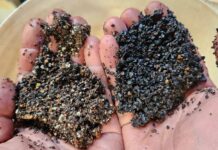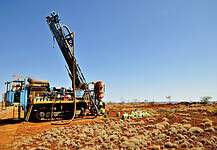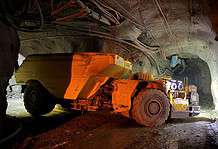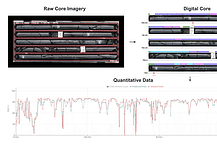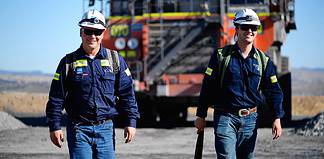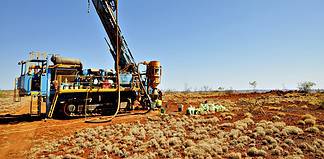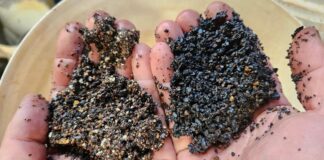Metro Mining had completed 17 shipments from its Bauxite Hills mine by September. Image: Metro Mining.
BY AMY BLOM
METRO Mining is continuing its successful ramp up of Bauxite Hills mine, bolstered by strong alumina prices and high Chinese demand.
Metro Mining is shaping up to finish the year on a strong note following a number of major successes coming out of its flagship Bauxite Hills mine in QLD.
The miner began first production at Bauxite Hills in April, 10 months after construction commenced, with most construction taking place in just five months.
First shipment left the Port of Skardon in early May.
Then in August, Metro was named the leading emerging company at the 2018 Diggers and Dealers Mining Forum.
At the time, Metro Mining managing director Simon Finnis said the award was a significant achievement for the company.
“Most importantly, the award acknowledges the effort of our mine-site and support team,” Mr Finnis said.
“The mine was constructed in near record-breaking time and commencement of operations, and quick ramp up, has involved considerable dedication, and of course hard work.”
By September, Metro Mining announced it had already shipped its first one million tonnes of bauxite with a total of 17 shipments.
The millionth tonne of bauxite was loaded aboard the bulk carrier Isa Oldendorff as part of a 60,000 tonne shipment bound for Metro’s foundation customer Xinfa Group.
Xinfa was one of China’s largest integrated aluminium companies with significant refining and smelting operations.
Metro had a four year binding off-take agreement to supply Xinfa with 1mt this year, followed by 2mtpa for each of the next three years.
Metro Mining shipped its first million tonnes of bauxite in September.
Sales Finalised
In September, Metro Mining also announced it had fully sold for planned 2018 production, having signed a contract with China’s State-owned State Power Investment Corporation Aluminium and Electric Power Investment Co (SPIC).
The contract was for 300,000 wet metric tonnes (wmt) of bauxite to be delivered by the end of the year, following a trial vessel previously delivered to SPIC.
Mr Finnis said he was delighted to have finalised a new offtake agreement with SPIC, which had the capacity to be another long-term off-take partner, and to have successfully sold all of Metro’s planned 2018 production.
“This year’s shipments will be made to five different Chinese customers, confirming strong demand for Metro bauxite in China,” Mr Finnis said.
“We are experiencing particular interest from refineries located in the inland provinces where supply of domestic bauxite has been hindered by recent mine closures and environmental audits.
“Our product specifications are well suited to their processing requirements.”
China recently began a crackdown on illegal bauxite mining while maintaining a focus on improving local environmental conditions.
The crackdown has seen domestic miners unable to use dynamite blasting for extracting ore and, in some cases they have been banned from using pneumatic drilling.
Under these circumstances, inland refiners’ profits fell significantly, with some refineries reportedly closing capacity in response.
Several Chinese refiners have since been actively seeking imported bauxite or looking to test samples of imported bauxite; the raw material used to make aluminium.
While Guinea remained China’s largest bauxite supplier, the situation has proven a boon for Australian operators including Metro Mining, which anticipated steady and continued demand for imported bauxite in the Chinese market over the next decade, driven by its domestic supply shortage.
According to Mr Finnis, negotiations were progressing well to finalise the 2019 sales program.
“Production at the Bauxite Hills mine is steadily increasing, and we are confident of reaching production guidance for this year,” Mr Finnis said.
“Given current demand we are actively looking at ways to increase 2019 production above the current planned rates.”
Metro Mining began first production at Bauxite Hills in April, just 10 months after construction commenced.
Positive Forecasts
According to research released in August by Perth-based broker Argonaut, Metro was successfully ramping-up, with operations in key areas including mining and shipping steadily increasing month on month.
Argonaut found Metro was achieving key milestone targets, including mining and ship loading rates of more than 10,000t per day and ship loading times of fewer than six days.
Metro had a guided target of between 1.98mt and 2mt mined and shipped in CY18.
This was expected to increase to 3mt in 2019, with a further increase to 6mtpa by 2021 following an expansion.
In the report, Argonaut stated that while there were no fatal flaws in the operating process at Bauxite Hills, it would like to see some additional capacity, or sprint capacity to offset the risk of a major disruptive event, potentially though minor, low cost debottlenecking initiatives.
This could include an additional screen ahead of barge loadout and additional barges to better manage tidal constraints.
In the report, Argonaut gave Metro a buy recommendation and 40 cent target price – more than double the price at the end of September, which stood at $0.18, suggesting significant potential.
Argonaut also reported that while still technically in ramp-up mode, it expected Bauxite Hills to begin producing positive cash flow in the September quarter.
The Bauxite Hills operation, 95km north of Weipa on Western Cape York, has an initial mine life of 17 years.
It has an estimated reserve of 92.2 million tonnes and total resources of 144.8 million tonnes.
Argonaut’s forecasts follow a successful June quarter, with Metro reporting production totalling 399,000t generating $25.2m of revenue at the mine.
Metro’s outstanding debt facilities, including accrued interest, were $40.6 million.
In June, Bauxite Hills mine shipped 214,000 wmt, mined 245,000wmt and recorded its first monthly profit.
Mr Finnis said while it had begun as a challenging quarter, Metro had still finished on a high.
By the end of the quarter, the Bauxite Hills was achieving the daily production required for the 2mtpa targeted production.
“I am extremely proud of how the site team and our contract partners responded to resolving issues as they arose,” Mr Finnis said.
“All aspects of the operation have finished the quarter performing strongly, and I look forward to the project reaching targeted operating rates during the September quarter.”
Early challenges included those presented by tropical Cyclone Nora, which hit QLD in late March, forcing the workforce to evacuate Bauxite Hills.
Despite a two week delay causing June to be a half month, the disruption had no apparent impact on Metro being able to meet its 2018 production target.
Mining operations at Bauxite Hills were only undertaken in the dry season, which was notionally an eight month period between April and November.
Further Exploration
While Metro’s focus has remained on its Bauxite Hills ramp-up, it was still committed to future exploration activities in the immediate area.
Exploration activities were expected to begin in July 2019 and would be aimed at identifying areas in the tenements close to Bauxite Hills mine infrastructure that would warrant detailed, grid-based drilling.
This initial exploration would involve ground traversing, mapping and wide-spaced reconnaissance drilling, where justified, using a tractor-mounted RC drill rig.
Metro controls about 1900sqkmof exploration tenements in Western Cape York, and has 19 granted exploration permits for minerals, six granted mining leases and four mining lease applications.
All of Metro’s tenements were on lateritic plateaus, which have a high potential to host bauxite mineralisation.
Metro Mining also owned Bundi coal tenements in the Surat Basin in QLD, however it no longer planned to engage in any substantial exploration and evaluation activities there, instead planning to dispose of its interest in the thermal coal resource, either through a trade sale, farm-out or joint venture arrangement.
In the meantime, Metro’s market strategy remained focussed on converting existing non-binding agreements into long-term agreements and developing a broad customer base to supply bauxite into long-term evergreen contracts.



